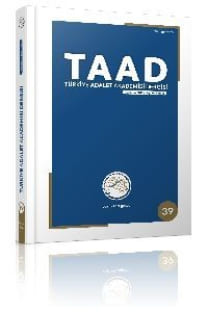TERK SEBEBİYLE BOŞANMAYA İLİŞKİN YARGITAY HUKUK GENEL KURULU’NUN 13.03.2015 TARİHLİ VE 2-1688/1032 SAYILI KARARININ DEĞERLENDİRİLMESİ
Terk sebebiyle boşanma, Türk hukukunda özel ve kusura dayanan boşanma sebeplerinden biri olarak varlığını korumaktadır. Terk sebebiyle boşanma sıkı şekil koşullarına bağlanmış olup, bu çalışmada önce terk sebebiyle boşanmaya ilişkin şartların içtihatlarda nasıl somutlaştırıldığı gösterilmektedir. Yargıtay’ın terkin haklı sebebe dayansa bile, bu haklılığın terk eden eşe süresiz olarak eve dönmeme hakkı vermeyeceğine ve haklı sebeple terk eden eşin kendisine eve dön ihtarı tebliğinden sonra boşanma davası açmasının dürüstlük kuralına aykırı olduğuna ilişkin yerleşik içtihadı bulunmaktadır. Bu içtihatlar özellikle terkin diğer eşin maddî ve manevî cebrinden kaynaklandığı hâllerde adaletsiz sonuçlar doğurmuştur. Yargıtay Hukuk Genel Kurulu’nun 13.03.2015 tarihli 2-1688/1032 sayılı kararında ise, bu adaletsiz yaklaşımdan dönülmüş ve böyle hâllerde diğer eşin zorlamasıyla ortak konutu terk eden eşin “terk edilmiş sayılacağı” belirlenerek, yerinde bir şekilde diğerini terke zorlayan eşin terk sebebiyle boşanma davası açma hakkı bulunmadığı sonucuna varılmıştır
Anahtar Kelimeler:
Boşanma, Terk, Diğer eşin maddî ve manevî cebri, Yargıtay Hukuk Genel Kurulu
The Evaluation About The Decision of the Turkish General Assembly of Civil Chambers of Court of Cassation Dated 13.03.2015, Numbered 2-1688/1032 About Desertion
The grounds for divorce in Turkey are set forth in Turkish Civil Code. One of them is regulated by the article 164 and defined as “desertion”. This ground occurs when only one of the spouses has left the other in order to refrain from his/her matrimonial obligations without a reasonable cause. If the abandonment continues at least four months and still goes on, the other spouse will be able to send a legal notice by the court or notary to the leaving spouse to return to marital home. When this legal notice is unanswered, the other spouse will be entitled to apply to the court for divorce due to desertion. The deserting spouse is considered as faulty. On the other hand, if one of the spouses causes the other to leave the marital home through misconduct, not the leaving spouse but the forcing the other to leave will be considered as deserting one. Nevertheless, in Turkey Court of Cassation concludes that the spouses leaving marital home with a reasonable cause -even if as a result of the misconduct of other spouse- do not have a right to leave unlimitedly. Therefore, when the abandonment takes a long time, it is concluded that the leaving spouse is considered as “deserting” and faulty one. However, the decision of the General Assembly of Civil Chambers of Court of Cassation dated 13.03.2015, numbered 2-1688/1032 presents a solution for this injustice
Keywords:
Divorce, Desertion, Misconduct of the other spouse, General Assembly of Civil Chambers of Court of Cassation,
___
- Akıntürk, Turgut/Ateş Karaman, Derya: Türk Medeni Hukuku, İkinci Cilt, Aile Hukuku, 14. Baskı, 2012, İstanbul.
- Ayan, Nurşen: “Terk Nedeniyle Boşanma”, Selçuk Üniversitesi Hukuk Fakültesi Dergisi, 2007, C. 15, Sa. 1, s. 39-54.
- Ceylan, Ebru: “Türk ve İsviçre Hukukunda Boşanmanın Hukuki Sonuçları”, 2006, Galatasaray Üniversitesi Yayınları, İstanbul.
- Coelho, Clarisse/Garaupa, Nuno: “Do Divorce Law Reforms Matter for Divorce Rates? Evidence from Protugal”, Journal of Empirical Legal Studies, vol. 3, iss:3, pp. 525-542, 2006.
- Dural, Mustafa/Öğüz, Tufan/ Gümüş M. Alper: Türk Özel Hukuku C. III Aile Hukuku, 11. baskı, 2016, İstanbul.
- González, Liberted/ Viitanen, Tarja: The Effect of Divorce Laws on Divorce Rates in Europe, IZA Discussion Paper No: 2023, Mart 2006.
- Guillod, Olivier: “Switzerland, A New Divorce Law for the Millenium”, Heinonline, 2000 In’l Surv. Fam. L., pp. 357-368 (e.t. 17.03.2018).
- Hausheer, Heinz. (Ed. ve çev. Ali Çivi/ Denise Unkan) “Yeni İsviçre Boşanma Hukuku’nun Önemli Yenilikleri”, İsviçre Medeni Kanunu ve Borçlar Kanununun Alınışının 80. Yılı, İstanbul, s. 29-52.
- Kandil, Seher: Türk Hukukunda Terk Sebebiyle Boşanma (TMK m. 164), Seçkin Kitabevi, Ankara, 2006.
- Oktay Özdemir, Saibe: “Türk Boşanma Sisteminde Revizyon İhtiyacı”, MHB, Yıl: 35, Sa. 1, 2015, s. 29-46.
- Öztan, Bilge: Aile Hukuku, 6. Baskı, Turhan Kitabevi, Ankara 2015.
- Yılmaz, Canan: Türk ve İsviçre Medeni Kanunlarına Göre Birlikte Yaşamaya Ara Verilmesi, Adalet Yayınevi, Ankara 2016.
- T.C. Aile ve Sosyal Politikalar Bakanlığı Aile ve Toplum Hizmetleri Genel Müdürlüğü, Türkiye Boşanma Nedenleri Araştırması TBNA 2014, https:// ailetoplum.aile.gov.tr/data/54292ce0369dc32358ee2a46/tbna2014_kitap. pdf .
- Yargıtay kararları için bkz. Kazancı İçtihat Bilgi Bankası (https://www.kazanci. com.tr/) ve https://emsalyargitay.gov.tr.
- ISSN: 1309-6826
- Başlangıç: 2010
- Yayıncı: Türkiye Adalet Akademisi
Sayıdaki Diğer Makaleler
İKİ ORTAKLI LİMİTED ŞİRKETTE ORTAĞIN ÇIKARILMASINDA GENEL KURUL KARARININ ARANMASI PROBLEMİ
ULUSLARARASI ADALET İSTATİSTİKLERİNDE KASTEN ÖLDÜRME
YERİNDEN YÖNETİM İLKESİ ÇERÇEVESİNDE KENTSEL DÖNÜŞÜMDE YETKİ UNSURU
İSLAM HUKUK METODOLOJİSİNDE İÇTİHADIN EPİSTEMOLOJİK DEĞERİ VE ETİK BOYUTU
